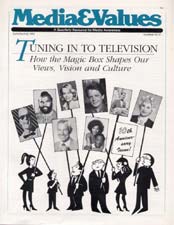PASTORING: 'Cosby' Preaches Loving Lessons
|
This article originally appeared in Issue# 40-41
|
The word is now out officially and it has been delivered by no less a source than priest-sociologist Andrew Greeley in the New York Times. Greeley reports that the most popular preacher in America is not John Cardinal O'Conner, nor Jim Bakker, nor Robert Schuller nor Rabbi Marc Tannenbaum. It is Bill Cosby.
Of course, we all kind of knew that already. The popularity of his television program has had its impact on our personal and organizational schedules. Beyond that, though, while watching Cosby and his family move through their TV lives, haven't we smiled with recognition at events and tensions, haven't we drawn hope from their realism and resolutions, haven't we made mental notes to use their situations or quotes in an upcoming homily or public presentation? In many ways Cosby grants permission for us to rehearse themes that we have wanted to emphasize but have avoided for a variety of reasons.
In the last two decades the leadership of religious institutions has become one of the most demanding jobs in all creation. The confusion of a culture in flux, the demands of various special-interest groups, even the advances in scholarship, have all worked to mute our voices when it comes to the clear and positive representation of symbols and truths that the history of human faith pursuit should have confirmed to us as being essential.
Cosby tells us that it's more than O.K. to live in covenant-based relationships, it's important to serve those around us; it's normal and enriching to struggle for resolution among competing goods. Greeley said it this way, "His program (Cosby) and the others (Family Ties, Growing Pains and other quality sitcoms) are based on the insight that implicit ethics and religion in a matrix of humor are highly commercial in a country where meaning and belonging are as important as they have ever been, and where those institutions traditionally charged with meaning and belonging — churches and schools — are failing to deliver sufficient amounts of either."
As Greeley also noted, the irony is that ministers of religion too often condemn television, while television does the work that they are not doing. He even proposes that anyone who can certify that they have viewed two of these programs twice in a week can be excused, if not from weekend religious services, then at least from the sermon!
Obviously, we cannot copy Cosby. He is a uniquely gifted human being. We can, however, from the depth of our own life journeys report on how we are advancing and stumbling in our walk with a God who is leading us into a confident future. For the people associated with us, that could be "prime time" in the best sense.



